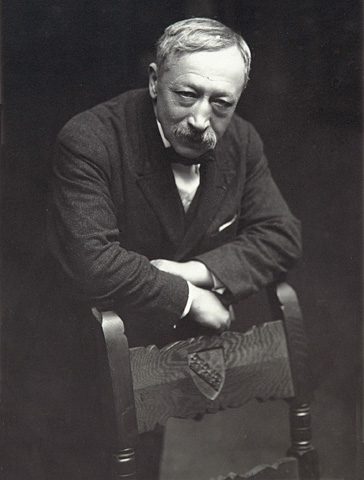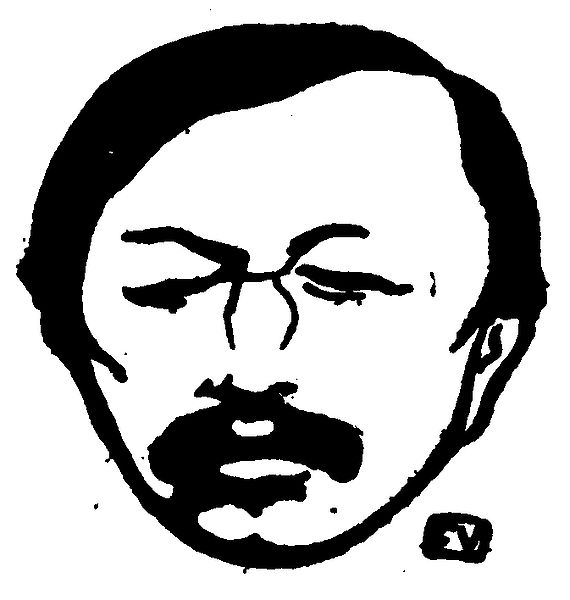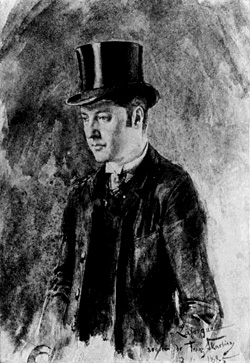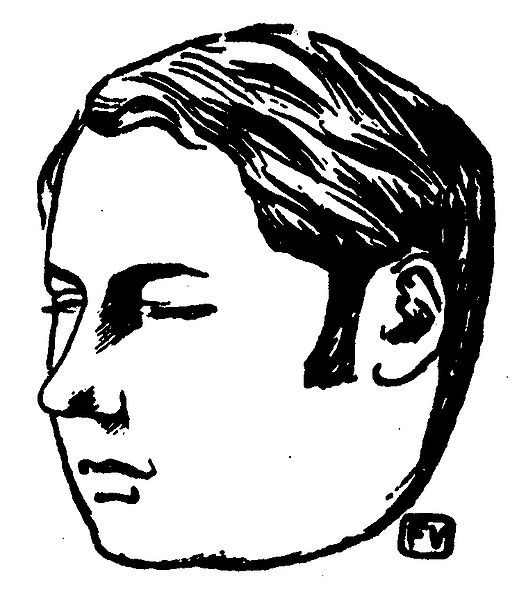<Back to Index>
- Poet and Critic Gustave Kahn, 1859
- Poet Jules Laforgue, 1860
PAGE SPONSOR


Gustave Kahn (December 21, 1859 - September 5, 1936) was a French Symbolist poet and art critic.
Kahn was born in Metz.
He claimed to have invented the term vers libre, or free verse; he was in any case one of the first European exponents of the form. His principal publications include Les Palais nomades, 1887, Domaine de fée, 1895, and Le Livre d'images, 1897. Kahn also made a valuable contribution to the history of the movement with his book Symbolistes et décadents, 1902.
In addition to his poems, Kahn was a public intellectual who wrote novels, plays and literary criticism. He played a key role in a number of periodicals, including La Vogue, La Revue Indépendante, La Revue Blanche and Le Mercure de France. He was also an art critic and collector who stayed current with developments in painting and sculpture until his death. He also played a role in a number of debates on public issues, including anarchism, feminism, socialism and Zionism.
Several of his poems were set to music by the composer Charles Loeffler.
-
-
- Les Paons
-
- Se penchant vers les dahlias,
- Des paons cabraient des rosaces lunaires,
- L'assouplissement des branches vénère
- Son pâle visage aux mourants dahlias.
- Elle écoute au loin les brèves musiques
- Nuit claire aux ramures d'accords,
- Et la lassitude a bercé son corps
- Au rythme odorant des pures musiques.
- Les paons ont dressé la rampe ocellée
- Pour la descente de ses yeux vers le tapis
- De choses et de sens
- Qui va vers l'horizon, parure vermiculée
- De son corps alangui.
- En l'âme se tapit
- le flou désir molide récits et d'encens.


Jules Laforgue (16 August 1860 - 20 August 1887) was an Franco - Uruguayan poet, often referred to as a Symbolist poet. Critics and commentators have also pointed to Impressionism as a direct influence and his poetry has been called "part - symbolist, part - impressionist".
His parents, Charles - Benoît Laforgue and Pauline Lacollay, met in Uruguay where his father worked first as a teacher and then a bank employee. Jules was the second of eleven children in the family, the eldest child being Jules' brother Émile, who was to become a sculptor of note. In 1866 the family moved back to France, to Tarbes, his father's hometown, but in 1867 Jules' father and mother chose to return to Uruguay, taking along their nine younger children, leaving Jules and his older brother Émile in Tarbes to be raised with a cousin's family.
In 1876 Jules's father took the family to Paris. In 1877, his mother died of pneumonia, three months after a miscarriage, and Jules, never a good student, failed his baccalaureate exams. He failed again in 1878, and then a third time, but on his own began to read the great French authors and visit the museums of Paris.
In 1879 his father became sick and returned to Tarbes, but Jules stayed behind in Paris. He published his first poem in Toulouse. By the end of the year, he had published several poems and was noticed by well known authors. In 1880 he moved in the literary circles of the capital and became a protégé of Paul Bourget, the editor of the review La Vie moderne.
Much happened to Laforgue in 1881: he attended a course of Taine's lectures and developed a great interest in painting and art. Charles Ephrussi, a rich collector, one of the first collectors of Impressionist art, took Laforgue on as his secretary. The direct influence of Impressionism on Laforgue's early development as a poet is a topic in Laforgue studies. In his introduction to his edition of Les Complaintes, Michael Collie, author of a biography of Laforgue (Laforgue (1963)), states that he sees a more or less conscious attempt on Laforgue's part to produce a literary equivalent of Impressionism. In 1881, Laforgue wrote a novel, Stephane Vassiliew and prepared a collection of poems entitled The Tears of the Earth, which he later abandoned, though some pieces were altered for Les Complaintes. Also in 1881, his sister left him alone in Paris to tend to their father who was seriously ill in Tarbes. When his father died, Laforgue did not attend his father's funeral.
From November 1881 until 1886, he lived in Berlin, working as the French reader for the Empress Augusta, a sort of cultural counselor. He was well paid and could pursue his interests very freely. In 1885, he wrote L'Imitation de Notre-Dame la Lune, widely regarded as his masterpiece.
In 1886, he returned to France and married Leah Lee, an Englishwoman. He died the next year of tuberculosis, his wife following him shortly thereafter.
Influenced by Walt Whitman, Laforgue was one of the first French poets to write in free verse. Philosophically, he was an ardent disciple of Schopenhauer and Von Hartmann. His poetry would be one of the major influences on Ezra Pound and the young T. S. Eliot (cf. Prufrock and other observations.) Louis Untermeyer wrote, "Prufrock, published in 1917, was immediately hailed as a new manner in English literature and belittled as an echo of Laforgue and the French symbolists to whom Eliot was indebted."